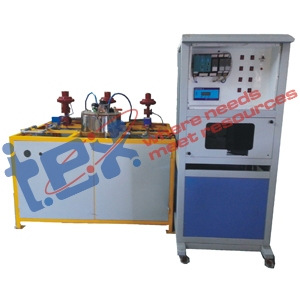

The Multi Loop Control Trainer is an advanced process control educational setup designed to study and analyze multi-variable process control systems. It allows students to understand how two or more control loops work simultaneously to maintain multiple process parameters such as temperature, pressure, flow, or level.
This multi loop control trainer provides a practical platform for learning interaction, tuning, and stability of multiple loops in process automation. Built for Engineering Colleges, Polytechnics, ITIs, and Research Laboratories, it helps students gain in-depth knowledge of advanced control strategies used in modern industries.
The multi loop control lab equipment consists of a process setup with multiple sensors, transmitters, actuators, and a digital PID controller capable of handling more than one loop simultaneously. Each loop can be configured independently or in combination to study interaction effects between variables.
This process control multi loop trainer allows students to simulate real-time control scenarios found in industrial automation — such as maintaining both temperature and flow in a heat exchanger or regulating pressure and level in a tank system.
Equipped with user-friendly controls, visual indicators, and a robust design, this multi loop control test rig ensures accurate experimentation, repeatable results, and safe operation, making it suitable for academic and training use.
| Specification | Details |
|---|---|
| Power Supply | 230V AC, 50Hz |
| Controller | Multi-channel digital PID controller |
| Number of Loops | 2 to 3 (temperature, level, flow, pressure – model specific) |
| Sensors | RTD, pressure transmitter, flow sensor, level transmitter |
| Actuators | Pneumatic control valves or motorized valves |
| Display | Digital indicators for each loop variable |
| Control Mode | Manual, automatic, and cascade modes |
| Construction | MS powder-coated frame with labeled front panel |
| Measuring Instruments | Gauges, meters, and digital displays |
| Safety Features | Overload protection, insulated wiring, emergency stop |
The Multi Loop Control Trainer provides comprehensive training in modern process control techniques used across industries. Students can visualize how multiple loops influence each other and learn practical methods for stability and response improvement.
This setup enhances understanding of feedback systems, PID tuning, and system dynamics, preparing learners for real-world applications in industrial automation and process engineering. It bridges the gap between theoretical learning and practical control operations, making it a vital educational tool for technical institutions.